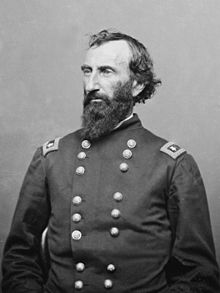John Alexander McClernand
| John Alexander McClernand | |
|---|---|

McClernand as a U.S. Army general
|
|
| Member of the United States House of Representatives for Illinois' 6th district | |
|
In office November 8, 1859 – October 28, 1861 |
|
| Preceded by | Charles D. Hodges |
| Succeeded by | Anthony L. Knapp |
| Member of the United States House of Representatives for Illinois' 2nd district | |
|
In office March 4, 1843 – March 3, 1851 |
|
| Preceded by | Zadok Casey |
| Succeeded by | Willis Allen |
| Member of the Illinois House of Representatives | |
|
In office 1840–1843 |
|
|
In office 1836 |
|
| Personal details | |
| Born | May 30, 1812 Breckinridge County, Kentucky |
| Died | September 20, 1900 (aged 88) Springfield, Illinois |
| Nationality | American |
| Political party | Democratic |
| Spouse(s) | Sarah McClernand, Minerva McClernand |
| Children | Edward John McClernand |
| Occupation | Military officer |
| Profession | Politician, lawyer |
| Military service | |
| Allegiance | United States of America |
| Service/branch |
United States Army Union Army |
| Years of service | 1832, 1861–1864 |
| Rank |
|
| Battles/wars | |
Black Hawk War
American Civil War
John Alexander McClernand (May 30, 1812 – September 20, 1900) was an American lawyer and politician, and a Union general in the American Civil War. He was a prominent Democratic politician in Illinois and a member of the United States House of Representatives before the war. McClernand was firmly dedicated to the principles of Jacksonian democracy and supported the Compromise of 1850.
McClernand was commissioned a brigadier general of volunteers in 1861. His was a classic case of the politician-in-uniform coming into conflict with career Army officers, graduates of the United States Military Academy. He served as a subordinate commander under Ulysses S. Grant in the Western Theater, fighting in the battles of Belmont, Fort Donelson, and Shiloh in 1861–62.
A close friend and political ally of Abraham Lincoln, McClernand was given permission to recruit a force to conduct an operation against Vicksburg, Mississippi, which would rival the effort of Grant, his department commander. Grant was able to neutralize McClernand's independent effort after it conducted an expedition to win the Battle of Arkansas Post, and McClernand became the senior corps commander in Grant's army for the Vicksburg Campaign in 1863. During the Siege of Vicksburg, Grant relieved McClernand of his command by citing his intemperate and unauthorized communication with the press, finally putting an end to a rivalry that had caused Grant discomfort since the beginning of the war. McClernand left the Army in 1864 and served as a judge and a politician in the postbellum era.
...
Wikipedia
